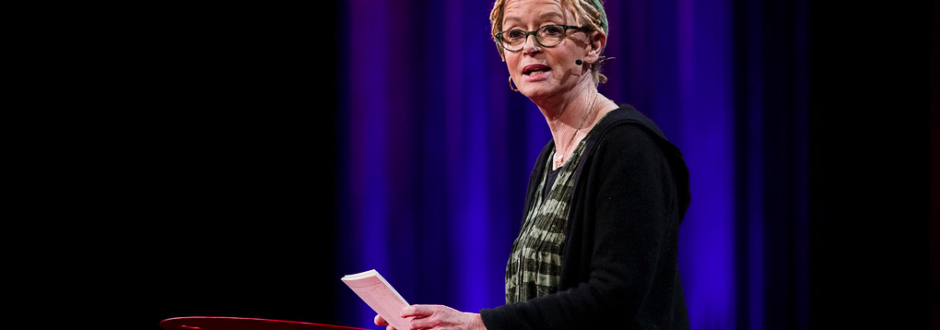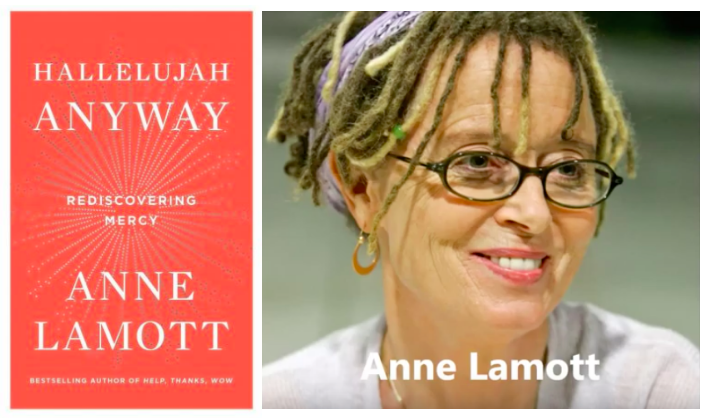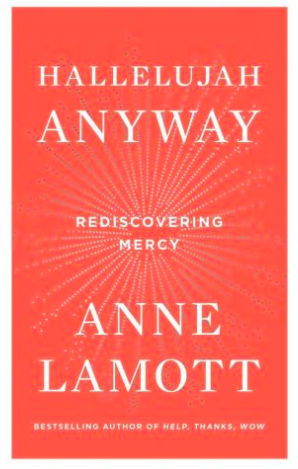“There are times in our lives – scary, unsettling times – when we know that we need help or answers but we’re not sure what kind, or even what the problem or question is,” beloved author Anne Lamott (1954-present) writes in the opening lines of Hallelujah Anyway: Rediscovering Mercy (2017), a beautiful compliment to her book on some of life’s most essential truths.
She continues:
“We look and look, tearing apart our lives like we’re searching for car keys in our couch, and we come up empty-handed. Then when we’re doing something stupid, like staring at the dog’s mismatched paws, we stumble across what we needed to find. Or even better, it finds us. It wasn’t what we were looking or hoping for, which was usually advice, approval, an advantage, safety, or relief from pain.”
Sometimes, that thing we need, that thing our soul aches for, without ever even realizing it, is mercy. Lamott writes:
“What if we know that forgiveness and mercy are what heal and restore and define us, that they actually are the fragrance that the rose leaves on the heel that crushes it?”
What is mercy?
“Misericordia is Latin for ‘mercy,’ from misericors,‘merciful,’ which is in turn derived from misereri, ‘to pity,’ and cor, ‘heart.’ Mercy means compassion, empathy, a heart for someone’s troubles. It is not something you do – it is something in you, accessed, revealed, or cultivated through use, like a muscle. We find it in the most unlikely places, never where we first look.”
Mercy, like grace, cannot be earned:
“Mercy is radical kindness. Mercy means offering or being offered aid in desperate straits. Mercy is not deserved. It involves absolving the unabsolvable, forgiving the unforgiveable. Mercy brings us to the miracle of apology, given and accepted, to unashamed humility when we have erred or forgotten. Charge it to our heads and not our hearts, as the elders in black churches have long said.”
Mercy is particularly useful in the midst of life’s messiness:
“Mercy, grace, forgiveness, and compassion are synonyms, and the approaches we might consider taking when facing a great big mess, especially the great mess of ourselves – our arrogance, greed, poverty, disease, prejudice. It includes everything out there that just makes us sick and makes us want to turn away, the idea of accepting life as it presents itself and doing goodness anyway, the belief that love and caring are marbled even into the worst life has to over.”
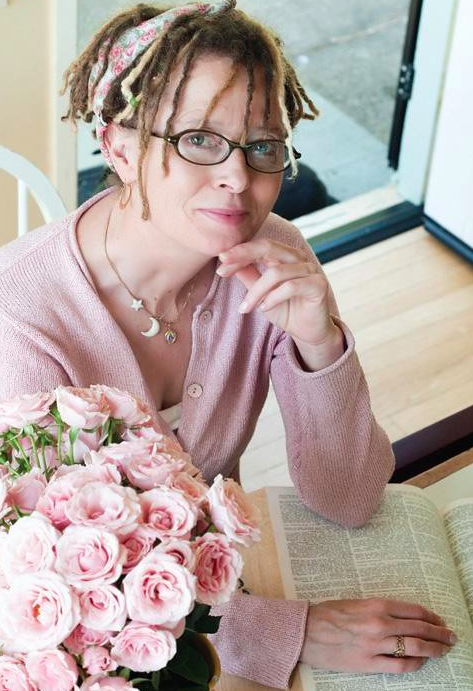
Mercy is both something we give and receive:
“The path away from judgment of self and neighbor requires major mercy, both giving and, horribly, receiving. Going without either of them leads to fundamentalism of all stripes, and fundamentalism is the bane of poor Mother Earth. Going without engenders blame, which offers its own solace but traps us like foxes. We trick our box traps with throw rugs and vases, until the pain grows too big. Then the only way out of jail is forgiveness.”
In other words, mercy isn’t just for others; we can extend it to ourselves, too:
“When we manage a flash of mercy for someone we don’t like, especially a truly awful person, including ourselves, we experience a great spiritual moment, a new point of view that can make us gasp. It gives us the chance to rediscover something both old and original, the sweet child in us who, all evidence to the contrary, was not killed off, but just put in the drawer. I realize now how desperately, how grievously, I have needed the necessary mercy to experience self-respect. It is what a lot of us were so frantic for all along, and we never knew it. We’ve tried almost suicidally for our whole lives to shake it from the boughs of the material world’s trees. But it comes from within, from love, from the flow of the universe; from inside the cluttered drawer.”
Mercy is a discipline, something to practice:
“Mercy means that we no longer constantly judge everybody’s large and tiny failures, foolish hearts, dubious convictions, and inevitable bad behavior. We will never do this perfectly, but how do we do it better? How do we mostly hold people we’ve encountered with the understanding of a wise,caring mother who has seen it all, knows that we all struggle, knows that on the inside we’re as vulnerable as a colony of rabbits?”
And means recognizing our shared humanity:
“Mercy means that we soften ever so slightly, so that we don’t have to condemn others for being total shits, although they may be that. (Okay: are.) If I do so, it makes me one. As Father Ed Dowling said, sometimes heaven is just a new pair of glasses. When we put them on, we see the awful person, sometimes even ourselves, a bit more gently, and we are blessed in return. It seems, on the face of things, like a decent deal.”
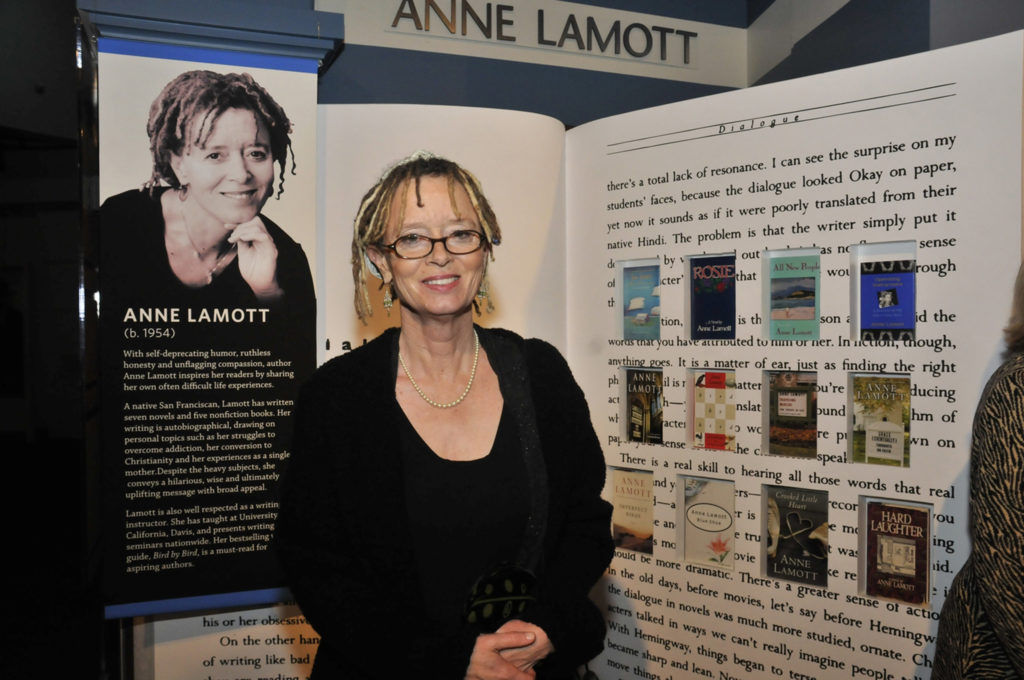
It can be quiet and subtle, not always a grand sweeping gesture:
“You don’t need special music and a Hollywood production and the Mormon Tabernacle Choir. You don’t need the Canadian fjords, the Grand Canyon, a newborn baby, although these can be helpful. You don’t need to go to Senegal. Immediacy and inspiration can be found in the dairy aisle at Safeway. It probably looks like people saying hello, making eye contact, letting others go first. Ordinary human daily ways, but moving more slowly. It looks like me with a few free minutes, deciding not to fill something in. Instead, I may close my eyes, drop to a quieter place, or look up into a tree or the sky. Even a moment’s transcendence changes us. Everything is different afterward because we deep-dove, were there in downward, inward, higher places. So we know now. We remember.”
Mercy comes from recognizing that we’re all broken:
“We are all gigantically flawed, such screw-ups. Everyone is broken, clingy, and scared, even the people who seem to have it most together. We are the brothers, and we are Joseph.* Or at least we were as children. Maybe we temporarily wanted people who hurt us to be punished, but then we couldn’t bear for them to suffer or be humiliated, because we saw ourselves in them.”
*This is a reference to Genesis 37–50, which tells the story of Joseph – the beloved son of Jacob – being sold into slavery by his brothers. Years later, during a food shortage in Canaan, Jacob sends Joseph’s brothers to Egypt to buy grains. When Joseph encounters his brothers, he forgives them for betraying him, telling them not to feel guilty since it was God’s plan for him to be in Egypt to preserve his family.
And that we are living in a broken world:
“Being alive here on earth has always been a mixed grill at best, lovely, hard, and confusing. Good and bad things happen to good and bad people. That’s not much of a system: a better one would be a silverware drawer for joy, sorrows, doldrums, madness, ease. But no, Eden explodes and we enter a dangerous, terrifying world, the same place where goodness, love, and kind intelligence life us so often. The world has an awful beauty. This is a chaotic place, humanity is a chaotic place, and I am a chaotic place.”
And realizing that God, in His loving kindness, extends His mercy to all:
“Pope Francis says the name of God is mercy. Our name was mercy, too, until we put it away to become more productive, more admired and less vulnerable. We tend to forget it’s still there. It’s our unclaimed selves, in the Lost and Found drawer, access to another frequency, like a tuning fork. It startles you when you hear it. You look up and around and respond. It’s part of human nature, the startle reflex. Grace and mercy build on this, on nature. We startle awake. This is part of the mystery, that the humane, humanity, human bodies, are where we experience transcendence and God, restoration, the inclination to serve those who are suffering. We reach out as we are reached out to.”
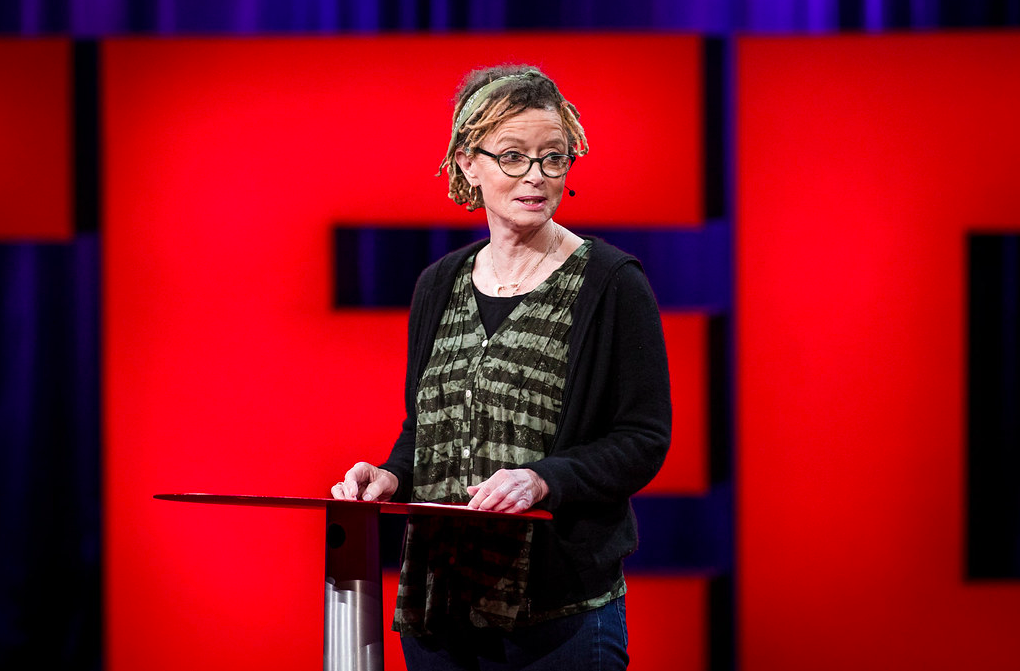
Recalling the Biblical story of the woman at the well, Lamott writes:
“Jesus said to the woman at the well,* Be like me: be true to who you really are; be in truth, share, and above all, try to forgive. This is such bad news for those of us who would like to even the score at some point. On bad days we can still feel, All my enemies are drowning and it’s the best day of my life. Jesus says, ‘That’s fine, honey, nice try; I still love you, but maybe you would consider restarting the forgiveness stuff? Maybe you might practice inclusion?”*
*This is a reference to John 4:1-42, which tells the story of Jesus’ interaction with a Samaritan woman at a well. Marginalized by society for having been married 5 times, she returns to her community transformed after Jesus tells her that He can give her “living water” so that she will never have to thirst again.
We learn, as time goes on, that mercy is more often the answer than not:
“Just to hear the words ‘mercy’ or ‘merciful’ can transform the whole day, because as the old saying goes, the soul rejoices in hearing what it already knows. Something lights up in me. We know mercy is always our salvation – as we age, as our grandchildren go down the same dark streets that called to their parents, as the ice caps melt. But I wish it was something else. I wish it was being able to figure things out, at which I am very good, or to assign blame, at which I am better, or to convince people of the rightness of my ideas….[b]ut now, hope of renewal and restoration is found in the merciful fibrillating heart of the world.”
In a beautiful passage that speaks to the difficulty of both giving and receiving mercy – ultimately of growing in personhood – Lamott writes:
“Micah says to do justice – follow the rules, do what you’re supposed to do – but to love mercy, love the warmth within us, that flow of generosity. Love mercy – accept the acceptance; receive the forgiveness, whenever we can, for as long as we can. Then pass it on. We are bread to be served to the poor and the hungry, and sometimes it is we who need the bread. To give it or receive it, we move out of our shells and personas, scooching toward the real. The real is hard, time-consuming, and badly lit. I much prefer fantasy.
And by the same token, change is hard. We like the familiar. We’re self-centered, and we have a lot of fear – equal fear of love and death. Welcome to the monkey house, as Vonnegut wrote.
We like breakthroughs, while the changes toward evolution and greater humanity are incremental. We don’t want to grow. It hurts. And yet we do, bravely and scared, bit by bit. We tell it – it hangs in the air with its amazingness – we begin to cooperate with kindness, and we remember the good we’ve seen in our lives. We soften ever so slightly, with one to two percent willingness, and I’ll be damned if that isn’t enough.
The Spanish poet Antonio Machado wrote, ‘Anyone who moves forward, even a little, is like Jesus walking on the water.’”
Hallelujah Anyway is another brilliant work of Anne Lamott’s, author of numerous bestsellers, including Almost Everything: Notes on Hope; Help, Thanks, Wow; Small Victories; Grace (Eventually).
She writes: “Yes, because in the words of Candi Staton’s great gospel song, ‘hallelujah anyway.’ Hallelujah that in spite of it all, there is love, there is singing, nature, laughing, mercy.”
Similar posts:
- Anne Lamott on Joy, Contentment and the Value We Have Within
- When Things Fall Apart: Pema Chödrön on the Precious Opportunities in Difficult Times
- Epictetus on How to Live a Good, Fulfilling Life
- The Dalai Lama and Archbishop Desmond Tutu on the Four Qualities of the Mind that Lead to Joyful Living
- Saint Augustine on the Happy Life and Finding Joy

